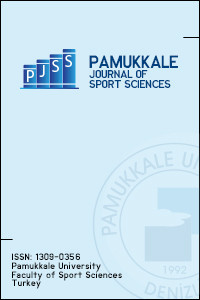INVESTIGATIONS ON PARTICIPATION AND OWNERSHIP OF SPECIAL FIELD COMPETENCES OF PHYSICAL EDUCATION AND SPORT TEACHER CANDIDATES
INVESTIGATIONS ON PARTICIPATION AND OWNERSHIP OF SPECIAL FIELD COMPETENCES OF PHYSICAL EDUCATION AND SPORT TEACHER CANDIDATES
Competence is defined as having the knowledge, skills and attitude needed for a role (Balcı, 2005); teacher competencies are defined as the knowledge, skills and attitude that will enable teachers to fulfill the demands of their profession effectively and efficiently (MEB, 2008). When the teaching profession is thought of as a profession of specialization, it can be seen that special field education and qualifications should be sought in teacher candidates. In this study, we aim to determine the rates of participation in and possession of the physical education and sports special field competencies for Physical Education and Sport Teacher candidates with undergraduate education in the field of sport sciences obtained through the Ministry of Education, Turkey. The research was conducted with a total of 1022 teacher candidates who had been educated in the highest grades of the physical education and sport teacher departments of 35 universities. In the study, the Physical Education Teacher Special Field competencies, which were put into effect by the Ministry of National Education and consist of six dimensions and 30 sub-competencies, were translated into the form of a measurement tool. In the analysis of the data, values were expressed using frequency and percentages and the t-test was used in binary comparisons. The significance level in the study was taken as 0.05. According to the findings of the research, the average participation score of physical education and sports teacher candidates in teacher competencies was higher than the average possession score, and the difference was found to be significant. When the teacher candidates' participation rates were evaluated according to gender, the difference between the average participation scores of male teacher candidates versus female teacher candidates was found to be significant. This difference stems from the high scores of male teacher candidates. When the rates of possession of competences of teacher candidates were evaluated according to gender, the difference between the average score of male candidates and the average score of female candidates was again found to be significant, and again, this difference stems from the high scores of male teacher candidates.
Keywords:
Teacher Candidate Physical Education and Sports, Competency,
___
- References 1. Akyüz, Y. (2003) Teacher Training and Delivery Principles, Practices, Reflections in Education: VII. Teacher Training Symposium in Contemporary Education Systems. 48-66 Ankara: Tekışık Publishing. 2. Allinder, R. M. (1994) The Relationship Between Efficacy and The Instructional Practices of Special Education Teachers and Consultants. Teacher Education and Special Education: The Journal of the Teacher Education Division of the Council for Exceptional Children, 17(2), 86–95. 3. Ashton PT. (1984) Teacher Efficacy: A Motivational Paradigm for Effective Teacher Education. Journal of Teacher Education, 35(5), 28–32. 4. Balcı, A. (2005) Explanatory Dictionary of Educational Management Terms. Ankara: Tek Wood Printing Publishing Distribution. 5. Book, C., Byers, J., Freeman, D. (1983) Student Expectations and Teacher Education Traditions with Which We Can and Cannot Live. Journal of Teacher Education. Vol. 34 (1), 9–13 https://doi.org/10.1177/002248718303400103 6. Çiltaş, A., Akıllı, M. (2011) Pedagogical Competence of Teachers. Mehmet Akif Ersoy University, Journal of Social Sciences (3) 4, 64–72. 7. Demircioğlu G. (2011) Validity and Reliability (E. Karip, Ed.) Measurement and Evaluation. Ankara: Pegem Academy. 8. Demirtaş, H., Cömert, M., Özer, N. (2011) Teacher Candidates' Self-Efficacy Beliefs and Attitudes Towards the Job. Education and Science. (36) 159, 96–111. 9. Fidan, M. (2012) Self-efficacy Perceptions of Science and Technology Special Field Competencies of Teachers and Teacher Candidates. Unpublished Master's Thesis, Ahi Evran University Institute of Science and Technology. 10. Gelen, İ., Özer, B. (2008) Assessment of Teacher Candidates and Teachers' Opinions about Levels of General Competencies in the Teaching Profession, Mustafa Kemal University Journal of Social Sciences Institute, 5 (9), 39–55. 11. Köroğlu, M., Sıvacı, S. Y. (2017) Investigation of the Relationship between Teacher Candidates' Special Field Qualifications and Learning Styles. Ahi Evran University Kırşehir Education Faculty Journal (KEFAD) 18(1), 471–483. 12. MEB (2006) General Competencies of the Teaching Profession. Ankara: General Directorate of Teacher Training and Education. 13. MEB(2008) Teacher Competencies: General and Special Field Qualifications of Teacher Profession. Ankara: Directorate of State Books, 1st Edition. 14. Meb.gov.tr.a -http://otmg.meb.gov.tr/YetGenel.html. Date of access: 05.04.2017 15. Meb.gov.tr.b- http://oygm.meb.gov.tr/www/ogretmenlik-meslegi-genel-yeterlikleri/icerik/ Date of access: 14.09.2016 16. Meb.gov.tr.c- http://meb.gov.tr/m/haber/13843/tr. Date of access: 05.10.2017 17. Kangalgil, M. (2014) Participation of Physical Education Teachers in Special Field Competences and Examination of the Grades of Ownership. Hacettepe University, Journal of Sports Sciences, 25(2), 94–103. 18. Özer, Y., Acar, M. (2011) A Scaling Study Using Binary Comparison Method on General Competencies of Teaching Profession. Çukurova University Journal of Education Faculty, 3(40), 89–101. 19. Seferoğlu, S.S. (2004) Teacher Candidates' Self-Assessment in Terms of Teacher Competencies. Hacettepe University Journal of Education Faculty, 26, 131–140. 20. Sönmez, V. (2003) Historical Basis of Education, Introduction to Teaching Profession. Ankara: Anı Publishing. 21. Sünbül, A. M., Arslan, C. (2007) Development of a Teacher Proficiency Scale and a Research Example. Selçuk University,Journal of Technical Education. http://tef.selcuk.edu.tr/salan/ sunbul/f/f17.pdf. Date of Access: 21.09.2011 22. Şişman, M. (2005) Introduction to Educational Sciences, Ankara: PegemA Publishing. 23. Şişman, M. (2009a) Rethinking Teacher Qualifications. Turkish Homeland Journal, 29, 37–41. 24. Şişman, M. (2009b) Teacher Competencies: A Modern Discourse and Rhetoric, İnönü University Journal of Education Faculty, 10(3), 63–82. 25. TED (2009) Teacher Competencies. Ankara: Name Okan Matbaacılık. YÖK (1998) Faculty of Education Teacher Training Undergraduate Programs. Ankara.
- Başlangıç: 2010
- Yayıncı: Pamukkale Üniversitesi
Sayıdaki Diğer Makaleler
Self-Objectification in the Fitness Center Environment: A Qualitative Perspective
Emine KUTLAY, Ercan HASLOFÇA, Tezan BİLDİK, Manuel SİLLERO QUİNTANA
Eda MUŞTU ÖZYAKAN, Leyla SARAÇ
EVALUATION OF GENDER KNOWLEDGE, BEHAVIORS AND ATTITUDES OF PHYSICAL TRAINING AND SPORTS STUDENTS
Nermin GÜRHAN, Azize ATLI ÖZBAŞ, Mehmet KOÇAK
Günay YILDIZER, Deniz ŞİMŞEK, İzzet KIRKAYA, Elvin ONARICI GÜNGÖR
Research of the Coordination Abilities in Rhythmic Gymnastics
